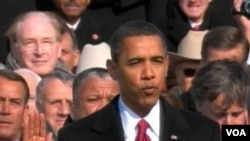Ghanaian-born scholar Geoge Ayittey says most Africans celebrate the re-election and second inauguration of Barack Obama as U.S. President. Ayittey, who is president of the Washington-based think tank Free Africa Foundation, says Mr. Obama’s re-election was significant, given the myriad of issues he faced during his first term.
"When he came to office, the U.S. economy was in a free fall. There was a global financial crisis. Unemployment was very high. So the President has done very well in terms of saving the U.S. economy,” he says.
Second Term
Some analysts say they expect President Obama to address African democracy and governance issues more aggressively during the next four years. Ayittey doesn’t think so.
“I doubt he’ll really have time to do that,” he says. “President Obama is again distracted from the real issues of democracy and governance. He is focusing more on terrorism in Africa.”
Ayittey notes the U.S. African Command (AFRICOM,) U.S. military assistance to help arrest Ugandan rebel leader Joseph Kony and the unfolding situation in Mali as factors that weigh heavily on the President and his foreign policy team.
US – Africa Relations
The Ghanaian-born analyst says the initiative to make Africa more relevant to U.S. policymakers needs to come from Africans. He blames Africa’s leadership for the lack of bold actions.
“Our leaders have failed us miserably,” he laments. “Look at countries like Zimbabwe, Eritrea and Ethiopia. You can’t expect the leaders there to come up with new initiatives.”
Freedom of Expression
Ayittey also criticizes much of Africa’s leadership for muzzling the voices of their people. He says true freedom of expression and press freedom exist in only eight African countries. The scholar says the lack of freedom of expression has had a stifling effect on the free flow and exchange of ideas.
“There are many Africans with ideas about how to move their countries forward. What they need is a basic freedom of expression. We can’t find solutions to our problems if Africans are not free to speak up and debate their ideas,” he says.
He calls on civil society groups to come up with more dynamic solutions to move their continent forward.
“It is not President Obama who’ll come and establish free media for us,” he says.
"When he came to office, the U.S. economy was in a free fall. There was a global financial crisis. Unemployment was very high. So the President has done very well in terms of saving the U.S. economy,” he says.
Second Term
Some analysts say they expect President Obama to address African democracy and governance issues more aggressively during the next four years. Ayittey doesn’t think so.
“I doubt he’ll really have time to do that,” he says. “President Obama is again distracted from the real issues of democracy and governance. He is focusing more on terrorism in Africa.”
Ayittey notes the U.S. African Command (AFRICOM,) U.S. military assistance to help arrest Ugandan rebel leader Joseph Kony and the unfolding situation in Mali as factors that weigh heavily on the President and his foreign policy team.
US – Africa Relations
The Ghanaian-born analyst says the initiative to make Africa more relevant to U.S. policymakers needs to come from Africans. He blames Africa’s leadership for the lack of bold actions.
“Our leaders have failed us miserably,” he laments. “Look at countries like Zimbabwe, Eritrea and Ethiopia. You can’t expect the leaders there to come up with new initiatives.”
Freedom of Expression
Ayittey also criticizes much of Africa’s leadership for muzzling the voices of their people. He says true freedom of expression and press freedom exist in only eight African countries. The scholar says the lack of freedom of expression has had a stifling effect on the free flow and exchange of ideas.
“There are many Africans with ideas about how to move their countries forward. What they need is a basic freedom of expression. We can’t find solutions to our problems if Africans are not free to speak up and debate their ideas,” he says.
He calls on civil society groups to come up with more dynamic solutions to move their continent forward.
“It is not President Obama who’ll come and establish free media for us,” he says.





